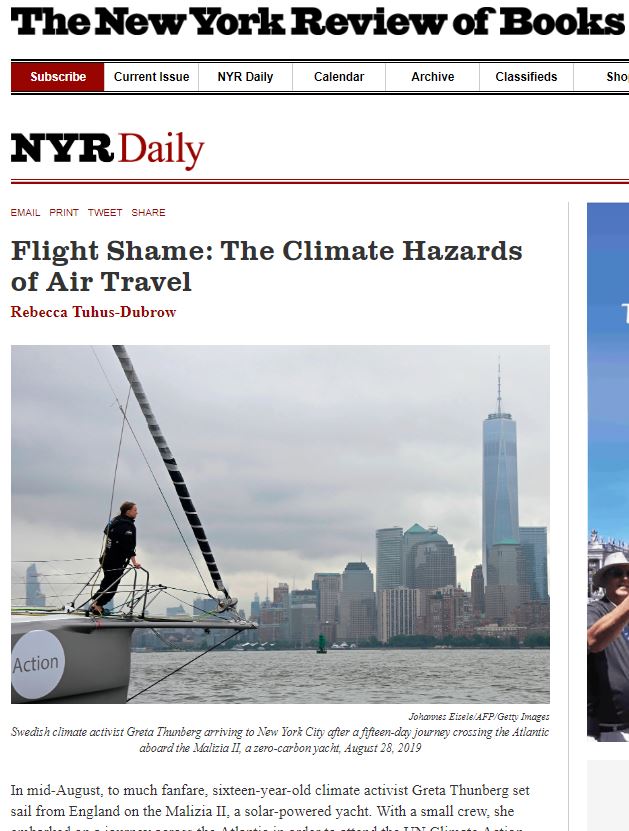In the New York Review of Books yesterday, Rebecca Tuhus-Dubrow puts her finger on what is so distinctive about aviation in a time of climate change:
Aviation has long enjoyed a kind of exceptionalism. Many people who take pride in their green lifestyles—perhaps they bike to work and always carry a travel mug—also happen to be frequent flyers. This incongruity grows in part out of cultural factors. A certain type (and I count myself in this category) aspires to be both worldly and socially conscious. We would never think of driving an SUV, say, but we’ve been known to drop the names of far-flung capitals we’ve visited. To be sure, our portable bamboo utensil sets and canvas grocery bags accord with our principles, but they also accord with our self-image, our aesthetics, our personal brands.
The article covers our university-centered petition, which now has 670 academic supporters. See also Twitter handle @flyingless and FAQ.
Parke Wilde, a food economist at Tufts University, and Joseph Nevins, a geographer at Vassar, established a petition, asking universities to take measures to reduce flying by faculty, staff, and students “commensurate with the cuts suggested by climate science.” …
To some environmentalists, particularly in the UK, there was a simpler, albeit not especially appealing, answer: If you want to prevent the damage caused by flying, you shouldn’t fly. Beyond Flying, an anthology that appeared in 2014, included essays mainly from British writers and activists, all of whom had changed their flying behavior as a result of climate concerns.
That book was pivotal for Parke Wilde, the Tufts food economist. Starting about a dozen years ago, he had begun to consciously reduce the number of flights he took. Then, inspired by the anthology and a couple of other non-flying academics—Kevin Anderson, a climate scientist in the UK, and Nevins, the Vassar geographer—he decided in 2014 to stop flying altogether. Wilde and Nevins run a blog titled Flying Less.
Non-flying academics can’t help but notice a conspicuous tension between, on the one hand, the espoused values of universities and professors, and, on the other, the flying behavior that is condoned, incentivized, and relished at their institutions. Professors are not especially highly paid, considering their educational credentials, and getting flown out to give talks and hobnob at conferences in destinations such as Berlin, Bangkok, or Johannesburg is a major perk of the job. At the same time, even if they would prefer to stay put, junior faculty members feel pressure to travel, in order to schmooze with colleagues and promote their work.
With their petition, which currently has signatures from more than 600 academics, Wilde and Nevins ask both universities and professional associations to take steps to modify this system. One idea they propose is the “regional hub” conference model, in which academics would congregate in their respective regions for personal connections and use video-conferencing to interact with other hubs. A few of these associations have begun to consider experiments with the conference model, which, after all, has remained static for decades—why shouldn’t it change in the face of both new technological options and new environmental imperatives?

